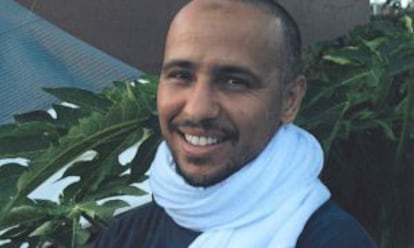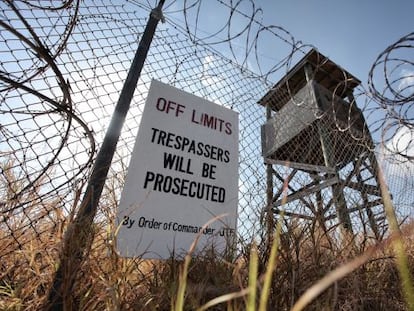Guant¨¢namo: A never-ending limbo
Of the nearly 800 inmates that the prison camp once held, only eight have been convicted
The McDonald¡¯s at the US Naval Station in Guant¨¢namo Bay once had its own role to play within the nearby military detention center. Government interrogators reportedly offered inmates food from the burger chain in exchange for information, according to a diary kept by Mohamedou Ould Slahi, one of the inmates at the Cuban camp.
Slahi has been held at the prison since 2002, without ever having been officially charged with any crime.
In 2005, he wrote Guant¨¢namo Diary, a 466-page account of his capture, rendition, torture and incarceration without charges. The book was tied up in legal litigation for years before finally being published in January.
Slahi wrote about the abuses he suffered, which included sleep deprivation, sexual humiliation and being held in stress positions
Yet after it was authorized, the book was heavily redacted by US government censors in Washington, with more than 2,500 words of his account removed.
Born in 1970, Slahi wrote about the abuses he suffered, which included sleep deprivation, sexual humiliation and being held in stress positions in freezing-cold cells.
The prison was created by the administration of US President George W. Bush to hold suspected terrorists following the September 11, 2001 attacks on the World Trade Center and the Pentagon.
Guant¨¢namo interrogators, he wrote, would sometimes eat their meals in front of the prisoners to provoke them.

¡°Each time they began to torture me, I refused to drink water or eat,¡±?Slahi wrote in his diary. ¡°[Female name redacted] brought in food from the outside just to frustrate me. ¡®Mmmm, this ham is delicious,¡¯ she would say.¡±
At the Guant¨¢namo McDonald¡¯s ¨C which has been open for 35 years, and looks just like any of the chain¡¯s stateside restaurants ¨C the two managers say they have no knowledge about any of the establishment¡¯s food being offered to inmates.
Omar Khadr, a Canadian citizen, was 16 years old when, in 2003, he was interrogated at Guant¨¢namo. His interrogators told him to choose between a Subway sandwich or a McDonald¡¯s burger, according to declassified recordings.
In 2010 he was transferred to a Canadian prison, where he was held until his release last Thursday thanks to a court order.
Whether or not the temptation of food is a card still being played by interrogators at the jail is a mystery, like so many other things at the naval base in the southeast of Cuba, which was set up in 1903 and is home to around 6,000 people.
¡°I too would be angry¡±
One of the sergeants at Camp 5 is on his first assignment with the military.
He is 34 years old and for the past five years has been a reservist with the California National Guard. He holds a regular job at a hotel.
For security reasons, he declined to give his name for this interview.
He arrived at Guant¨¢namo eight months ago and has one month more before his duties at the camp end.
¡°It was kind of surreal when I first got here because this is Guant¨¢namo. It has been in the public eye a lot. But really I have to be a professional,¡± he explains.
During his time as prison guard supervisor, he has had some contact with some of the inmates and says he understands how their anxieties grow as they await release.
Of the 122 inmates at Guant¨¢namo, 57 have been authorized to leave for a third country when a foreign government decides to accept them.
¡°I tell them, ¡®I understand your frustrations, I am listening to you, I understand perfectly but I can¡¯t do anything. I am here to take care of you and feed you¡¯,¡± says the sergeant, who says he is unaware of the reasons for each inmate¡¯s detention.
¡°¡®I too would be angry, but I am only a sergeant,¡¯ I tell them. ¡®That¡¯s a decision for the colonels, generals and whoever else. I cannot release you¡¯.¡±
According to a document prepared by the military command at the prison, Guant¨¢namo continues to be ¡°a key intelligence resource,¡± and has helped ¡°prevent terrorist attacks and has saved lives.¡±
Inmate Slahi is a perfect example of the limbo of indefinite detention ¨C without going through a courtroom ¨C that persists in Guant¨¢namo. His story is not an exception, but instead the rule.
Guant¨¢namo has held 779 inmates, but since the military commissions ¨C which act like courts ¨C were first established in 2003, just eight prisoners have been tried and convicted. Of those cases, three inmates had their convictions overturned and were sent to live in other countries. Another three are still serving out their sentences at the military detention camp and the remaining two were transferred to other nations.
Of the 122 inmates that are now at the camp, only seven are facing charges.
¡°It goes to show the absolute failure of procedures. It is an embarrassing chapter in our history,¡± says Linda Moreno, one of Slahi¡¯s five lawyers, who all work pro bono and meet with their client every two months or so at Guant¨¢namo.
Laura Pitter, counter-terrorism advisor for Human Rights Watch in the United States, has called the judicial proceedings held at the base ¡°a complete disaster.¡±
Pitter, who travels frequently to Guant¨¢namo to observe the military commission hearings, criticizes the US government¡¯s ambiguity as to the type of law it uses ¨C civil or military codes ¨C and the lack of transparency in the indictments.
¡°[The prisoners] should be brought before a court with fair standards or set free,¡± she said.
Slahi, who is from Mauritania, also symbolizes the paranoia that existed following the September 11, 2001 attacks, which marked the start of the Bush administration¡¯s so-called war on terror.
In November 2001, he was put on board a secret CIA rendition flight that took him from Mauritania to Jordan, where he was held in a secret prison. The following July, Slahi was taken to an Afghan prison and one month later brought to Guant¨¢namo.
According to his book, and as has been confirmed by official investigations, he was frequently abused by his captors.

The Pentagon doesn¡¯t consider that the so-called ¡°enhanced interrogation techniques¡± used at Guant¨¢namo ¨C which it authorized ¨C constituted torture, and none of the supervisors at the camp have been punished for their actions.
Slahi, who lived for a time in Germany and Canada, began training at an Al Qaeda camp in the early 1990s and fought against the communist government in Afghanistan, which at the time the United States considered an enemy.
He was arrested by US authorities for his possible links to terrorists and was considered to be a dangerous person, but no charges have ever been filed against him.
In 2010, a federal judge granted his request for a writ to habeus corpus and ordered him released. The US government appealed the ruling and now the case has been paralyzed.
The US Defense Department is in charge of appointing the judges, prosecutors and supervisors of the military commissions at Guant¨¢namo.
Slahi was arrested for terrorism links and is considered dangerous but no charges have been filed against him
Lt. Col. Myles Caggins, the Defense Department¡¯s detentions spokesman, attributed the low number of cases before the commission to the difficulties that have surfaced in getting all the evidence ¨C confessions obtained under torture cannot be used ¨C and the complexity of the cases, which also explains why it is taking so long before they are seen.
The seven inmates facing charges have all been at the pretrial stage for months. Delays continue and it is not known when their trial will begin.
The commissions are centering their questionable jurisdiction on two cases built around the alleged mastermind behind the September 11 attacks and his four collaborators, and another defendant who was allegedly responsible for the attack on the USS Cole in Yemen in 2000.
But the system the US government has been using to try ¡°unlawful enemy combats¡± has been flawed from the start.
In 2006, the US Supreme Court said the rules used to try them violated the Geneva Convention ¨C which prohibits coercive interrogations ¨C and were not approved by Congress.
The only seven inmates who are facing charges have all been at the pre-trial stage for months
President Barack Obama established certain rights for the inmates when he signed an executive order in 2011 renewing the commissions after he failed to win lawmakers¡¯ support to have the Guant¨¢namo inmates tried in stateside courts.
But the controversies continue.
In 2013, it was revealed that prosecutors on the commissions were spying on defense lawyers. Then in March of this year, the supervisor of the commissions resigned after he had asked the judges to reside permanently at Guant¨¢namo and was accused of trying to exert an "unlawful influence" in some cases.
The commissions have gone through six supervisors while the prosecution has changed hands five times.
In the last chapter of his book, Slahi writes: ¡°I would like to think that the majority of Americans want justice to be served and are not interested in financing the imprisonment of innocent people.¡±
Tu suscripci¨®n se est¨¢ usando en otro dispositivo
?Quieres a?adir otro usuario a tu suscripci¨®n?
Si contin¨²as leyendo en este dispositivo, no se podr¨¢ leer en el otro.
FlechaTu suscripci¨®n se est¨¢ usando en otro dispositivo y solo puedes acceder a EL PA?S desde un dispositivo a la vez.
Si quieres compartir tu cuenta, cambia tu suscripci¨®n a la modalidad Premium, as¨ª podr¨¢s a?adir otro usuario. Cada uno acceder¨¢ con su propia cuenta de email, lo que os permitir¨¢ personalizar vuestra experiencia en EL PA?S.
En el caso de no saber qui¨¦n est¨¢ usando tu cuenta, te recomendamos cambiar tu contrase?a aqu¨ª.
Si decides continuar compartiendo tu cuenta, este mensaje se mostrar¨¢ en tu dispositivo y en el de la otra persona que est¨¢ usando tu cuenta de forma indefinida, afectando a tu experiencia de lectura. Puedes consultar aqu¨ª los t¨¦rminos y condiciones de la suscripci¨®n digital.
More information










































